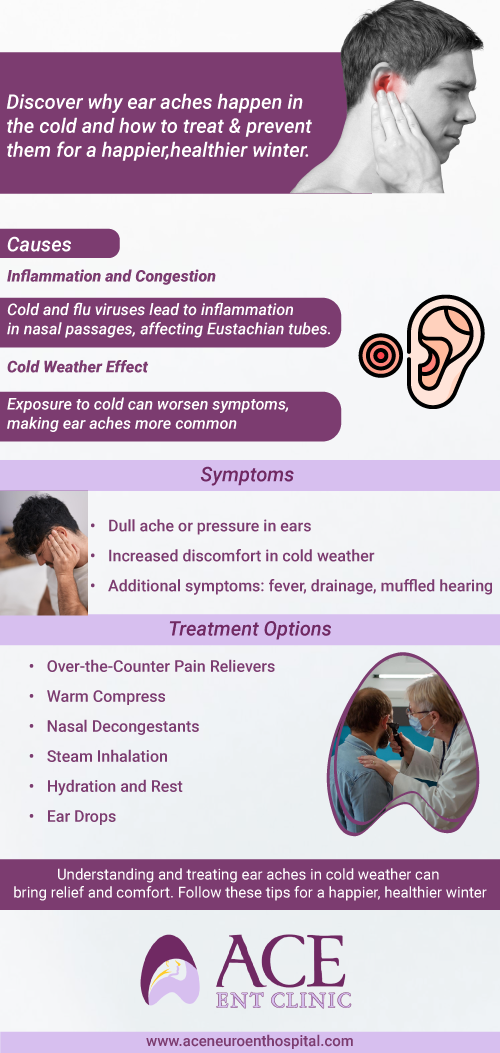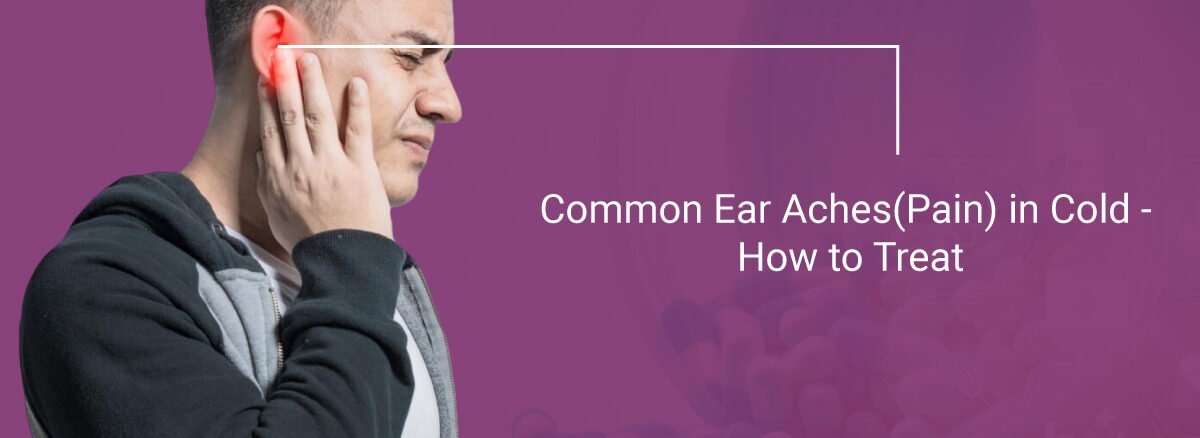As the chilly winds of winter approach, so does the season of colds and flu. Along with the sniffles and sneezes, many people also experience the discomfort of earaches during cold weather. Ear pain in common cold situations is quite common and can be quite bothersome. Understanding why it happens and how to effectively treat it can bring relief and comfort during the colder months.
What Causes Ear Aches in Cold Weather?
When the body is fighting off a common cold ear pain or flu virus, it can lead to inflammation and congestion in the nasal passages and throat. This congestion can also affect the Eustachian tubes, which are small passages that connect the middle ear to the back of the nose and throat. When these tubes become blocked or inflamed, it can cause a buildup of pressure in the ears, leading to pain and discomfort. Additionally, cold weather itself can sometimes exacerbate these symptoms, making earaches more common during the winter months.

Symptoms of Ear Aches in Cold Weather
- Ear pain in common cold situations: This pain is often described as a dull ache or pressure in one or both ears.
- Ear pain in cold weather: Exposure to cold temperatures can sometimes intensify the discomfort experienced in the ears.
- Common cold ear infection: In some cases, the congestion and inflammation associated with a cold can lead to an ear infection, which may cause additional symptoms such as fever, drainage from the ear, and hearing loss.
- Common cold-blocked ears: Blocked ears, often accompanied by a sensation of fullness or muffled hearing, are also common symptoms experienced during a cold.
Treatment Options for Ear Aches in Cold Weather
- Over-the-Counter Pain Relievers:- For mild to moderate common cold ear pain, over-the-counter pain relievers such as ibuprofen or acetaminophen can help alleviate discomfort and reduce inflammation. It’s essential to follow the recommended dosage instructions and consult with a healthcare professional if you have any underlying health conditions or are taking other medications.
- Warm Compress:- Applying a warm compress to the affected ear can help soothe discomfort and promote drainage of fluid from the Eustachian tubes. Simply soak a clean cloth in warm water, wring out excess moisture, and hold it against the ear for 10-15 minutes at a time. Be sure the compress is not too hot to avoid burns.
- Nasal Decongestants:- Using nasal decongestants or saline nasal sprays can help reduce congestion in the nasal passages, which may alleviate pressure in the common cold ear pain. However, it’s essential to use these products according to the instructions and avoid prolonged use, as overuse can lead to rebound congestion.
- Steam Inhalation:- Inhaling steam from a bowl of hot water or taking a warm shower can help loosen mucus and relieve congestion in the nasal passages and Eustachian tubes. Adding a few drops of eucalyptus or peppermint oil to the water can enhance the decongestant effect.
- Hydration:- Drinking plenty of fluids, such as water, herbal teas, and broths, can help thin mucus and promote drainage, which may alleviate pressure in the ears. Avoiding caffeine and alcohol, which can cause dehydration, is also recommended.
- Rest:- Getting plenty of rest allows the body to focus its energy on fighting off the ear pain in common cold and promoting healing. It’s essential to listen to your body and permit yourself to rest when needed.
- Ear Drops:- Over-the-counter ear drops containing a combination of ingredients such as hydrogen peroxide, glycerin, and/or olive oil can help soften earwax and promote drainage from the ears. However, it’s essential to use these drops cautiously and avoid inserting anything into the ear canal if you suspect you have a perforated eardrum or an active ear infection.
Preventing Ear Aches in Cold Weather
While it may not always be possible to prevent ear aches during cold weather entirely, there are steps you can take to reduce your risk:
- Practice good hand hygiene: Wash your hands frequently with soap and water or use hand sanitizer to reduce your risk of catching a cold or flu virus.
- Avoid close contact with sick individuals: Try to avoid close contact with people who have cold or flu symptoms to reduce your risk of exposure to viruses.
- Stay hydrated: Drinking plenty of fluids helps keep the mucous membranes in your nose and throat moist, which can help prevent congestion and reduce your risk of developing earaches.
- Use a humidifier: Using a humidifier in your home can help add moisture to the air, which can prevent dryness in your nasal passages and reduce your risk of developing congestion and earaches.
When to See the Doctor?
If ear pain in cold weather persists despite home remedies or is accompanied by severe symptoms such as high fever, severe headache, or difficulty hearing, it’s essential to seek medical attention promptly. A healthcare professional can assess your symptoms, rule out any underlying conditions, and recommend appropriate treatment, such as prescription ear drops or antibiotics for an ear infection.
Conclusion
Experiencing common cold ear infections in this weather can be uncomfortable, but understanding the underlying causes and knowing how to effectively treat and prevent them can help alleviate discomfort and promote healing. By following the tips outlined above and seeking medical attention if necessary, you can keep your ears happy and healthy throughout the winter months.
Simple Bhadania is a well-regarded ENT surgeon; if you’re searching for an expert ENT physician, give her a call. Ear, nose, and throat (ENT) specialist Dr. Simple Bhadania is a highly qualified surgeon who practices in Ahmedabad. Her tremendous clinical judgment and surgical skills are a reflection of her solid mastery of the anatomy and physiology of the head and neck region. To allay worries and follow each patient through to complete recovery, Dr. Simple goes above and beyond. Such commitment and willingness to go above and above are extremely uncommon.


